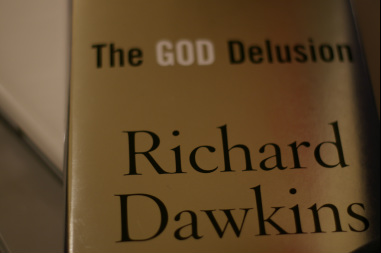
Since then, he has proceeded to email me Richard Dawkins videos, talking about how inspiring and scintillating his hero is. (I don’t get it – Dawkins is the nastiest, most pompous little man I’ve ever seen, and his arguments all seem to be based on straw men or irrelevant red herrings. To each his own, I suppose.)
So what brought all of this on?
My client may have been stewing about it for some time, having read my account of the intellectual process I followed to go from atheistic feminism to born-again Christianity. It’s highly readable, or so they say, which apparently doesn’t sit well with highly educated atheists.
Not that this client ever said anything to me about the book at all. And, in fact, it wasn’t until this past summer that he came out of the closet as a fire-breathing atheist. The immediate cause of this self-revelation was the impending death of a close relative of his, and a phone conversation in which he informed me that all these silly religions are alike – that they all require, as our tickets into the afterlife, that we be good people.
Thinking he had possibly forgotten the clear gospel presentation in my memoir, or perhaps had not read the book after all, I finally sent him an email to correct his misperceptions. While it didn’t budge him – the Dawkins adoration continues unabated – I’m hoping it has planted a seed that will one day, before it’s too late, germinate. Perhaps it would help you with your own gospel-sowing efforts; if so, please feel free to use any or all of it.
Here’s the guts of my message to this client:
"… In point of fact, there's one theology that says quite the opposite, and that's biblical Christianity. It says that we must be perfect to enter heaven, that none of us can possibly be good enough to meet God's standard of perfection, that we have all sinned – i.e., rebelled against Him – by repeatedly breaking His clearly stated law, and that not even all the good works and rituals in the world can pay for a single sin.
"(This is something we should be able to grasp easily, in light of our justice system: A host of good deeds would do nothing to mitigate the guilt of a convicted murderer or thief. Good deeds do not erase the crime; the penalty must be paid.)
"In fact, Christianity stands alone in saying that the only way into heaven is to have all our sins paid for by a perfect sacrifice, and that it’s only possible through the shed blood of Jesus Christ, God incarnate, who paid the penalty for the sins of the world when He died on the cross. It says furthermore that to avail ourselves of that payment, we must do two things:
1) Repent -- acknowledge our sinfulness according to His definition of sin, not ours, and to turn from it; and
2) Trust in Christ alone (not in our theoretical "goodness") to have paid our penalty in full.
"That's it in a nutshell -- no need for anything else, not even baptisms or rituals or church attendance or liturgies.
"If it's not true, then Christianity is simply a very odd theology, strangely different from every religious system that man has ever dreamed up.
"But if it is true -- and through my own intensive investigation of all major world religions in 2000-2001, I became 100% convinced that it is, as outlined in Heaven Without Her – it seems dangerous to shrug it off, to treat it as less significant than one's next vacation or business trip. Eternity is surely nothing to mess around with.
"At the very least, it seems wise to do a 'just in case' investigation of Christianity's claim to be ultimate truth. Perhaps it can be proven a grand lie, in which case we could rest in the idea that surely we’re good enough to get into any paradise that might exist.
"But could one really rest, without knowing the details -- like whose standard of goodness will apply? Or how good is good enough? Or what if I’m one good deed short of admission? Or what if I make it but my loved ones do not?
"If where we spend eternity is solely a function of our behavior in this life, I’d sure want to know where the bar’s been set, and by whom, and how I'm doing so far.
"Only genuine Christianity answers every question we could have on this subject, via a book that is demonstrably other-worldly, containing as it does so much information that its writers could not possibly have known without the help of someone outside of time ..."
 RSS Feed
RSS Feed